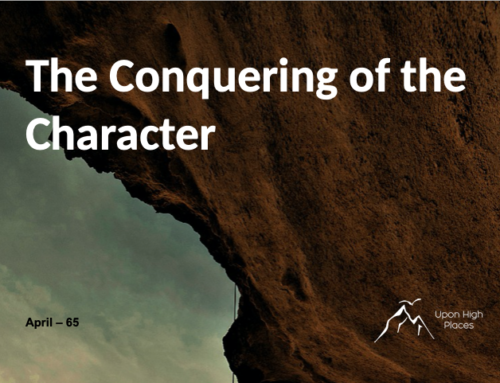The Journey of Life
February 2022
My dear youth:
I have been able to have the experience of traveling in different kinds of boats on oceans, seas, lakes, and rivers. I once spent almost three days on a large ferry. When I was very young, I had the experience of going out to sea a few miles aboard a small fishing boat belonging to some of my father’s friends. It moved so much that I almost didn’t survive to tell the tale. Sailing has always had the same feeling of vulnerability, of being exposed to the whims of nature.
The great journey of life
Experts of the sea say that different instruments are needed to navigate, without which such a feat would be impossible: compass, nautical charts, or nautical needle, sextant, depth sounder, GPS, anchor, and others. Of course, although this depends on the size of the ship and the time. In ancient times navigation was more insecure and dangerous, especially with small ships. Many poets and writers have compared life to a boat trip across the sea and just like in the real sea, sometimes we are surprised by storms that threaten to sink our small and fragile vessel. Despite this, whoever wants to reach a safe harbor will have to continue sailing and avoiding obstacles. If one gives up, the ship can flood and sink. Expert sailors know that the sea is an unpredictable environment and that a storm can break out at any moment that puts the ship and their lives in danger. That is why they are equipped and count on their experience and value.
Preparation for the crossing
When the ancient navigators undertook their adventures in search of the discovery of new territories, they had to equip themselves with provisions, navigation charts and many other things, but they especially had to prepare themselves mentally to be able to face this challenge, which by the way was not at all popular. In ancient times, people believed that the sea had limits and that once they reached them, ships could fall into the void. Few were those who had the vision and courage to challenge these beliefs; among them we find the great discoverers. Without taking into account prejudices and unfounded opinions, with many empty spaces still on the maps, they threw themselves into the sea with the thought that they were going to be successful, and today the world owes them a lot.
The father of historiography, Herodotus, who lived between 484 and 425 B.C., is counted among those who ventured to travel and discover new territories. This helped him to elaborate his Historiae (The nine books of history), a work considered to be the first description of the ancient world. His audacity, tenacity, and courage produced fruits that served as an inspiration for humanity. Marco Polo, tireless traveler of the Middle Ages, left us his legacy, The Book of the Wonders of the World, which came to serve as a reference to Christopher Columbus. Others, like Magellan, James Cook, Alexander von Humboldt, Falcon Scott, and many more entered unknown paths to open new routes to humanity.
In the spiritual life, there are few who set sail to reach the safe harbor of the heavenly mansions. There are many factors that stop them. They do not want to leave their comfort zone, they are not willing to make sacrifices, they are afraid of risks, they have not had experiences in the life of faith. The Christian who does not study his Bible, nor does he make its content his own, will easily become discouraged when a small storm breaks out, because he is not anchored in its promises, in its prophecies, in its teachings, and it is very easy to be carried here and there by all kinds of winds.
Another factor that leads to failure is not doing anything for others. Living in our bubble of selfishness suffocates us. A Christian committed to God commits himself to his neighbor to be an example, to contribute to making this world better, to elevate suffering humanity. Jesus spent more time healing people than preaching the Gospel. It is not that the latter is not necessary, it is, but blessing our neighbor is also pure Gospel. The Lord Jesus Christ made the decision to come to this world, despite all the tempests and storms that He had to face. He knew that saving the human being required a total dedication, a great risk—like when one sails the high seas—to conquer your heart and mine. Aren’t you moved by this dear youth? It was not easy for our Lord, facing the storms of life, human contempt, ignominy, ridicule, sin… all these things hurt His pure heart. But He kept sailing until He achieved His purpose of completing the work of redemption. Christ’s dedication, love, fervor, constancy, and fidelity made the Savior “a Man of sorrows and acquainted with grief.…” Isaiah 53:3; “…compassionate and merciful” James 5:11; in His grace and power “… always leads us in triumph.” 2 Corinthians 2:14; promises sanity: “I will restore health to you and heal you of your wounds.” Jeremiah 30:17; and by the experience that He acquired in His incarnation, He promises us a sure guide: “I will bring the blind by a way they did not know… I will make darkness light before them.” Isaiah 42:16.
Jesus is in the vessel
A story that I really like of the work of the Lord Jesus has to do with a boat and the sea. We find it in Matthew 8. The story goes that the disciples of Christ were in the Sea of Galilee. I had the privilege of being in this place and sailing through its waters. About forty people were on the boat and we were all brethren from the church. It was at an international youth congress that we held in Israel in 2010. Just when we were on that ship, I had the opportunity to preach a message to my brethren was based on the experience that the apostles had with Christ.
Jesus got into a boat and His disciples followed him. They started sailing when suddenly a big storm that no one expected broke out. It was of such magnitude that the waves covered the boat, but contrary to what one might expect, the Master slept. The disciples were probably stunned when they saw that, despite the unleashed fury of the elements, Jesus slept peacefully. They did their best to bail the water that entered the boat, and when they saw that they were getting nowhere they woke up Jesus and begged Him to help them because they saw the boat sinking, and with it their lives.
Jesus’ response is very encouraging, because it shows us that there is nothing to fear when He is in our boat: “Why are you fearful, O you of little faith?” Matthew 8:26. It is as if He had said to them: “Do you not realize that I am with you and that you need not fear?” At the moment he arose and rebuked the winds and made the sea calm. Isn’t it wonderful, dear youth? The element that appears here as the tool to successfully cross the sea of life is faith. Every youth who prides himself on being a Christian needs to develop faith, which is a divine gift. Through faith you can see the calm behind the storm. In every storm the hand of God is at the helm of the ship. When it seems that the waves are about to take us to the bottom of the sea, faith allows us to cling to with certainty that God is the Owner of nature and that, just as Christ calmed the Galilean storm that day, He will also rebuke our storm and will calm it down.
Conclusion
May the Lord help us to trust completely in His Word, that what He has said will be fulfilled and that nothing that threatens our peace is so great and uncontrollable that God cannot neutralize and solve it. God bless you. Amen.
José Vicente Giner
Pastor and leader of the Youth Department
of the General Conference
For personal and group reflection:
-
Why has life been compared to a voyage across the sea?
-
What do we need most, in your opinion, for our personal journey through the sea of life?








